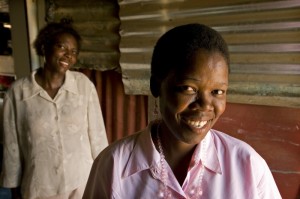Bringing mercy home

Last month I won a free subscription to the glitzy celebrity magazine US Weekly. At first I was skeptical, but I’ll admit it’s become a guilty pleasure: After working on poverty issues all week at Oxfam, I kind of enjoy reading about fashion faux pas and learning how celebrities are “just like us!”
I never thought the two worlds would collide, but they did last week, when the magazine covered pop singer Madonna’s battle to adopt Mercy James, a 3-year-old girl from Malawi. It was bizarre to flip through those shiny pages, filled with expensive clothes and glamorous photos, and then read about a country with a reported 1.5 million children orphaned by HIV/AIDS.
Of course, many celebrities are extraordinarily generous with their time and money when it comes to fighting poverty. And because of their roles as spokespeople, they can help raise public awareness as well.
Celebrity adoptions, though, are more controversial. Some see Madonna’s efforts to bring home Mercy (who would be her second child adopted from Malawi) as a form of neocolonialism, African orphans as fashion accessories; others call it “child trafficking” and claim Madonna is using her money and fame to speed up the process. Save the Children UK publicly condemned her actions, saying: “The best place for a child is in his or her family in their home community.”
As someone who works at an NGO, I can see how there’s something arbitrary, almost unfair, about plucking one girl out of poverty and into a life of wealth and privilege. Why Mercy and not another, equally deserving, child? Why this village and not the next one, where the need may be dire? In the long run, one adoption–or two–won’t make a difference in the fight against poverty.
But at the same time, I can see the good in Madonna’s actions. She’s reportedly given millions to the country though her nonprofit, Raising Malawi, and recently co-directed a documentary about HIV/AIDS-affected kids. And in the long run, her adoption attempt generated increased media coverage about Africa, the HIV/AIDS crisis, and the lives of the families affected by it: a dialogue that’s reached to some unlikely places, including the pages of US Weekly.
If Americans are going to read about HIV/AIDS-affected people in Africa, though, I’d rather they hear about the kinds of people we work with at Oxfam–change agents, caregivers, and community leaders–instead of children to be scooped up and rescued. “[Celebrities] always tend to portray Africa as a horrendous basket case,” author Dambisa Moyo said recently. “Taking a picture with a starving African child–that doesn’t help me raise an African child to believe she can be an engineer or a doctor.”
Indeed, the stories of everyday people making a difference may not have the same drama factor as orphans rescued from poverty–but they give us real hope for widespread change, not just a Hollywood happy ending.